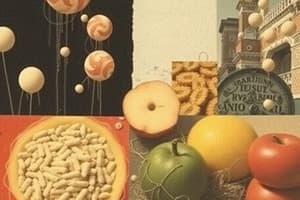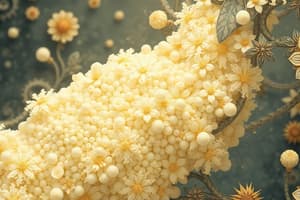Podcast
Questions and Answers
Which of the following is NOT a type of simple carbohydrate?
Which of the following is NOT a type of simple carbohydrate?
- Fructose
- Starch (correct)
- Glucose
- Sucrose
What is the main purpose of glycolysis in carbohydrate metabolism?
What is the main purpose of glycolysis in carbohydrate metabolism?
- Convert glucose into fatty acids
- Store excess glucose as starch
- Convert glucose into pyruvate to produce energy (correct)
- Transport glucose to the bloodstream
How does glycogenolysis function in the body?
How does glycogenolysis function in the body?
- It converts glucose into glycogen
- It breaks down glycogen into glucose for energy (correct)
- It metabolizes fiber into sugars
- It helps absorb monosaccharides in the intestine
Which food is a good source of complex carbohydrates?
Which food is a good source of complex carbohydrates?
What is the primary sugar found in milk and yogurt?
What is the primary sugar found in milk and yogurt?
Which of the following foods is high in natural sugars but also provides fiber?
Which of the following foods is high in natural sugars but also provides fiber?
Which carbohydrate is primarily indigestible and assists with digestive health?
Which carbohydrate is primarily indigestible and assists with digestive health?
What role does salivary amylase play in carbohydrate digestion?
What role does salivary amylase play in carbohydrate digestion?
Which of the following is a primary function of glycogenesis?
Which of the following is a primary function of glycogenesis?
Which of the following is NOT considered a whole grain?
Which of the following is NOT considered a whole grain?
Flashcards are hidden until you start studying
Study Notes
Types of Carbohydrates
-
Simple Carbohydrates:
- Composed of one or two sugar units (monosaccharides and disaccharides).
- Examples include glucose, fructose, sucrose, and lactose.
-
Complex Carbohydrates:
- Made up of longer chains of sugar units (oligosaccharides and polysaccharides).
- Includes starch, glycogen, and fiber.
-
Fiber:
- A type of complex carbohydrate that is not digestible.
- Important for digestive health and helps regulate blood sugar levels.
Carbohydrate Metabolism
-
Digestion:
- Begins in the mouth with salivary amylase breaking down starch.
- Continues in the small intestine where enzymes further digest carbohydrates into monosaccharides.
-
Absorption:
- Monosaccharides are absorbed into the bloodstream through the intestinal wall.
- Glucose is transported to cells for energy or stored as glycogen in the liver and muscles.
-
Glycolysis:
- The metabolic pathway that converts glucose into pyruvate, producing energy (ATP).
-
Glycogenesis:
- The process of converting excess glucose into glycogen for storage.
-
Glycogenolysis:
- The breakdown of glycogen into glucose when energy is needed.
Dietary Sources
-
Whole Grains:
- Brown rice, quinoa, oats, and whole wheat products.
-
Fruits:
- Apples, bananas, berries, and oranges are rich in natural sugars and fiber.
-
Vegetables:
- Leafy greens, carrots, and sweet potatoes provide carbohydrates and fiber.
-
Legumes:
- Beans, lentils, and peas are high in complex carbohydrates and protein.
-
Dairy:
- Milk and yogurt contain lactose, a natural sugar.
-
Sugary Foods:
- Sweets, sodas, and baked goods contain high levels of simple sugars but should be consumed in moderation.
Types of Carbohydrates
- Simple carbohydrates consist of one or two sugar units, known as monosaccharides (e.g., glucose, fructose) and disaccharides (e.g., sucrose, lactose).
- Complex carbohydrates have longer chains of sugar units, categorized as oligosaccharides and polysaccharides, with examples including starch, glycogen, and fiber.
- Fiber, a non-digestible complex carbohydrate, is essential for digestive health and aids in regulating blood sugar levels.
Carbohydrate Metabolism
- Digestion of carbohydrates starts in the mouth where salivary amylase begins breaking down starch, and continues in the small intestine with enzymes converting carbs into monosaccharides.
- Monosaccharides are absorbed into the bloodstream through the intestinal wall, with glucose being the primary form utilized for energy or stored as glycogen in the liver and muscles.
- Glycolysis refers to the metabolic pathway that transforms glucose into pyruvate, yielding energy in the form of ATP.
- Glycogenesis is the process that converts excess glucose into glycogen for energy storage.
- Glycogenolysis is the breakdown of glycogen back into glucose during times of energy need.
Dietary Sources
- Whole grains such as brown rice, quinoa, oats, and whole wheat products are rich in complex carbohydrates.
- Fruits like apples, bananas, berries, and oranges offer natural sugars and fiber, enhancing nutritional value.
- Vegetables, including leafy greens, carrots, and sweet potatoes, provide both carbohydrates and beneficial fiber.
- Legumes, such as beans, lentils, and peas, are abundant in complex carbohydrates and protein, making them nutritious food sources.
- Dairy products like milk and yogurt contain lactose, a form of natural sugar.
- Sugary foods, including sweets, sodas, and baked goods, are high in simple sugars and should be consumed in moderation to maintain health.
Studying That Suits You
Use AI to generate personalized quizzes and flashcards to suit your learning preferences.





